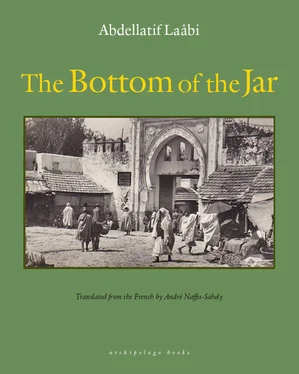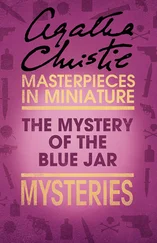The scatological element of the story diminished over time. The Fezzis, however, did hold on to the notion that by wanting to get to the bottom of things, one usually hit on distasteful truths, vile things that are best left unseen lest one winds up making sworn enemies. The flawless reasoning of the Jesuits! This also exists in the lands of Islam. But when it comes to the Fezzis, who are sophists at heart, this was interpreted differently and has now come to mean the exact opposite. In its newfound form, it designates a vast repertory of horrible words and idioms that are enjoyed in the company of a select few: double-edged words, metaphorical expressions, witty one-liners, and allusions that only the initiated can grasp, prompting them to burst into ecstasies, much to the chagrin of the laymen around them.
This “bottom of the jar” has spread far beyond the city of Moulay Idriss, and for that matter far beyond the reaches of the imperialism that the Fezzis often profited from — and still do — even though they believe that there’s a bottom as well as a rock bottom. Let’s be fair and leave to one side those who, admittedly, weren’t able grasp the full sense of the story unless they happened to have heard it related in their own accent, with their own expressions and gestures, their naïveté and endearing certitude, a conviction fairly common among tribes and peoples, of being the center of the universe.
But enough of these tiring platitudes. There’s still a little left in the jar for those with a taste for it.
NIGHT HAD FALLEN and the family was still gathered in the apartment that my father had rented in the new town after Ghita’s untimely death. An ironic twist: The apartment was part of the L’Urbaine complex, the flagship modern development during the days of the protectorate. It was where the upper crust of French civil servants and other influential people once lived. Despite the ravages of time, the building was in decent shape. At least to the casual observer, since once you got past the gates, the truth in the old adage “other times, other customs” emerged. The majority of the mailboxes were gone and those that had survived dangled loosely right in front of the diligent postman’s eyes. The elevator was nothing but a distant memory, attested to by a majestic, iron-clad cage that was irremediably empty. It was a good thing that Driss’s apartment was on the first floor. But let’s move on.
The television was always on and the lively conversations ignored the images in the background and drowned out its accompanying decibels. We were taking part in a ritual that always took place when we got together: bringing Ghita’s sayings and doings back to life, her unforgettably epic opinions.
“Do you remember what she said about fasting one day during Ramadan?”
“And when we moved to the house in Siaj and she couldn’t stand the fact that we’d be under the eyes of our first-floor neighbors?”
“And the time when she played a trick on Touissa when we were in Sidi Harazem?”
“And the pot that she emptied in the toilet the day the khatib was murdered?”
“What was it she used to say to express how nothing got past her?”
“If I step on a raisin I can immediately taste its sweetness in my mouth.”
“And the first time she went to the cinema.”
“The things she said about poor Farid al-Atrash!”
Speaking of the cinema, I still haven’t told you that beautiful story. I’d gone to see a film at the Boujeloud — I was wearing a coat that I’d just bought. When I got there, I took it off and hung it on the back of my seat. It was only after I’d come home that I realized I’d forgotten it. Ghita was beside herself. She promised she would light seven candles to Saint Sidi Abdelkader Jilani if he helped us recover the coat. I went back to the cinema and miraculously found the coat exactly where I’d left it. Ghita was ecstatic, but when I reminded her of the seven candles she’d promised to Sidi Abdelkader Jilani, without batting an eyelid she said, “So what? We have the coat in our hands right here, so the saint can go take a hike!”
Along those lines, television began to run the evening news. I used what influence I had to call for silence. I expected the fall of the Berlin Wall to be among the top headlines. How naïve I was. For almost half an hour, the wooden anchorman focused on royal audiences, foundation-laying ceremonies presided over by ministers who didn’t even know how to hold a trowel, and soporific debates being held before a mostly empty parliament. He then apologized that due to the “wealth of material” he could only gloss over the international news in brief. We were finally allowed images of the Berlin Wall, pieces of which were being grabbed by its brave dismantlers as if they were holy relics.
Driss, who still has a lively interest in politics, surprised us with the following remark: “Only Hikler could have ordered the destruction of that wall.”
“No, Father, Hitler is dead,” I said, thinking it was advisable to correct him.
“That’s only what they tell us. It seems he’s still alive. But God knows best.”
“Believe me, Father, he died when I was still crawling around on all fours.”
“If you say so. .”
Entertained as I was by this exchange, it only served to make Ghita’s absence more painfully felt. I thought about what she might have said in these circumstances. The sweet wind of her presence brought a smile back to my lips. Written by both our hands, it’s only fitting that our story comes to a close by giving the last words to her.
“Pahh, is that the only news they could find to tell us! A falling wall. . it can’t have been built very solidly. The walls of Fez are still standing after all.”
Créteil — Fez
May 2000 — June 2001
1Expert in Islamic law.
2Walled Jewish quarters in Moroccan cities, originally set up to protect its inhabitants from pogroms.
3Laâbi’s note: Neggafate is the plural of neggafa , women who more often than not are of black ancestry, and who provide a number of services. They are responsible for the bride from the ritual grooming right up to when she is led to the altar, where they proffer advice suitable to the occasion, including tips on various erotic techniques.
4Habib Bourguiba (1903–2000) was Tunisia’s first president after independence from the French and led the country from 1957 until 1987, when his newly appointed prime minister, Zine El Abidine ben Ali, used a number of medical reports to declare Bourguiba unfit to rule, at which point he was deposed. Ben Ali was of course later the first leader to be overthrown during the Arab Spring in 2011.
5Laâbi’s note: The ellipsis isn’t meant to censor the word. The point was to demonstrate how the people of Fez pronounce words, usually dropping the first consonant, where instead of saying qaf they will say af .
6Minor ablutions are washing the face and hands up to the elbows, the feet up to the ankles, and rubbing water on one’s head. These are usually performed before prayers. Major ablutions are washing the entire body and must be performed after sexual intercourse.
7The nationalist leader of the Democratic Independence Party, formed in 1946 as a splinter from Allal al-Fassi’s Istiqlal Party.
8Khattabi (1880–1963) was a Berber political and military leader during the Rif War (1921–1926), who initially defeated and chased the Spanish out of northern Morocco but was later destroyed by the French. He was exiled to the island of Réunion and kept under house arrest from 1926 until 1947. He later sought asylum in Egypt, where he died.
9The “yellow spirit,” a jinni that loves perfume, music, and dance and leaves laughter and happiness in her wake. When she takes possession of an individual, she sharpens their wit.
Читать дальше












